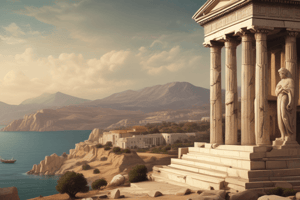Podcast
Questions and Answers
What caused a third of the Athenian population to die in 430 BC?
What caused a third of the Athenian population to die in 430 BC?
- Flooding
- A plague outbreak (correct)
- The Spartan invasion
- Famine
Who dominated Greece for thirty years after defeating Athens?
Who dominated Greece for thirty years after defeating Athens?
- Thebes
- Macedonia
- Persia
- Sparta (correct)
Which Greek king conquered all of Greece before his son Alexander came to power?
Which Greek king conquered all of Greece before his son Alexander came to power?
- Spartacus
- Leonidas
- Philip II (correct)
- Pericles
What was the main type of food consumed by the Greek people?
What was the main type of food consumed by the Greek people?
In ancient Greece, who received education according to the text?
In ancient Greece, who received education according to the text?
What was the main purpose of sending boys to schools in Sparta according to the text?
What was the main purpose of sending boys to schools in Sparta according to the text?
Which ancient civilization in Europe is considered the first?
Which ancient civilization in Europe is considered the first?
Which city-state in ancient Greece was primarily focused on fighting wars?
Which city-state in ancient Greece was primarily focused on fighting wars?
Which ancient civilization in the eastern Mediterranean was known for its trading activities?
Which ancient civilization in the eastern Mediterranean was known for its trading activities?
Who were the two most powerful city-states in ancient Greece?
Who were the two most powerful city-states in ancient Greece?
Which group invaded Greece from the north and drove the Mycenaeans off to Asia?
Which group invaded Greece from the north and drove the Mycenaeans off to Asia?
Against which empire did Greek armies, under Spartan leadership, fight back and achieve victory?
Against which empire did Greek armies, under Spartan leadership, fight back and achieve victory?
Flashcards are hidden until you start studying
Study Notes
Ancient Greece
- Ancient Greece was the first civilization in Europe, developing around the eastern Mediterranean Sea.
- It was the birthplace of democracy and saw the emergence of powerful cities, great thinkers, and scientists.
Aegean Civilizations
- Civilization in the eastern Mediterranean began around 3000 BC on the island of Crete.
- The Minoans were skilled sailors who accumulated wealth through trade.
- Around 1500 BC, the powerful town of Mycenae on the southern Greek mainland conquered and took control of Crete.
- Three centuries later, the Dorians invaded Greece from the north and drove the Mycenaeans out to Asia.
City States
- After 1000 BC, the Dorians and Ionians settled in eastern Greece and built large cities, each with their own governments, armies, and independence.
- The two most powerful city-states were Sparta and Athens.
- Sparta was a dominant city-state focused on war, with a strong army and a history of conquering neighboring cities and enslaving their populations.
- Athens, on the other hand, concentrated on trade, science, and other fields, and was the first city to establish a democratic government.
Persian Wars
- Around 500 BC, the Persian Empire under Darius I invaded many Greek cities on the Asian coast.
- By 490 BC, the Persians attacked the Greek mainland, but were defeated by Greek armies under Spartan leadership.
Peloponnesian War
- Under the rule of Pericles, Athens became the most powerful city-state and controlled much of eastern Greece.
- Pericles sought to make Athens a beautiful city with many temples, and art, philosophy, and general knowledge became prominent.
- Sparta, fearing Athens' growing power, began a war against Athens in 431 BC, which eventually led to Athens' surrender.
Macedonian Rule
- As Greek city-states weakened, Macedonia, a kingdom to the north of Greece, grew stronger and eventually conquered all of Greece under King Philipp II.
- His son, Alexander, came to power in 336 BC and went on to conquer Persia and spread Greek ideas and culture throughout western Asia and the Middle East.
Roman Rule
- In 140 BC, Rome took over Greece and the city-states, and they remained under Roman rule until 395 AD, when they became part of the Byzantine Empire.
Daily Life in Ancient Greece
- Men were the heads of most Greek families, and richer families had slaves who were commanded by the wives.
- Women usually married at a young age, while men married later.
- Ancient Greek society was divided into citizens and non-citizens, with citizens being free men and noblemen who owned land and participated in government.
- Education in Athens focused on general subjects like music, writing, mathematics, and reading, as well as physical exercise.
- Education in Sparta was geared towards military training, with boys being sent to military schools to become good soldiers.
- The Greek diet consisted of food made from grains, fish, eggs, vegetables, and fruit.
- Greek men and women wore garments made of linen or wool, with women's garments typically covering their legs down to their ankles.
Studying That Suits You
Use AI to generate personalized quizzes and flashcards to suit your learning preferences.




